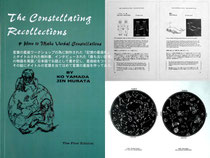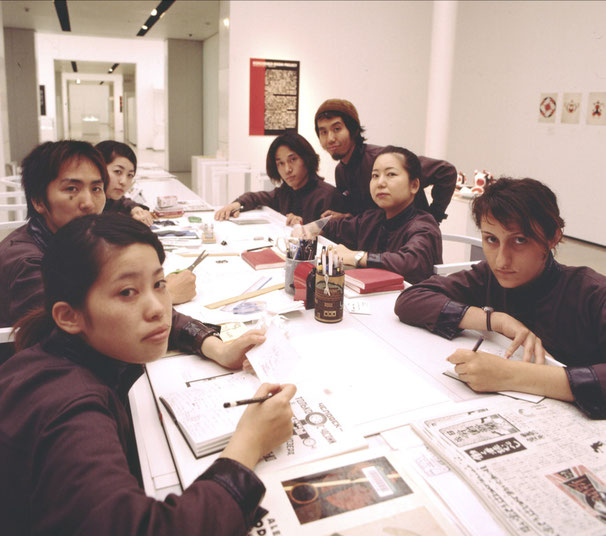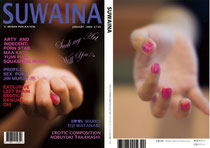Book / Newspaper Projects
●Book Projects / ブックプロジェクト
●Nomin-Tan (tales of farmland)ノウミンたん
「個人による農業が禁じられた未来」というディストピアへ、転生した主人公が、もとの世界に戻るためには伝説の「ノウミンたん」を探せと教えられ、それを探して旅を続ける中で、その世界で社会に抗って隠れて農業を営む人々に出会い成長していくライトノベルの創作(著者:やまこ 名義ー山田亘)から始まるプロジェクト。小説内の世界で出会う人々をモデルとした写真と文章で構成され、出版された文庫と共に展示される。




●Constellating Recollections (book project & performance workshop) collaboration project with Jin Murata 記憶の星座(詩人、村田仁氏との共同プロジェクト

About Recollection
Longing for the past or talking about memories is not always considered as good behavior. It is even sometimes considered as a negative behavior because it would not create anything new. However, I was questioning if it is like that. Is the action of recollection only a nostalgic action of looking at "the past" that existed somewhere?
The incident that only you know and remember about, exists in your head "right now." Every time you remember, the memory loses some details, changes, or turns itself from a bad one into a good one. People create it all over again from the beginning every time they recollect what is considered as ''the past“ Recollections are creative actions that you are not aware that they are.
Dawn of “I”
We interviewed and asked various people of various generations "What is the oldest memory you can remember?" It is the oldest appearance of "I" that you can remember by yourself. Such memories often include some omissions, emphasis, and misunderstandings. It is just “the way you remember”. However, there might be a result of unconscious effort of searching for an appearance that should have been, within these changes in the memory. In that way, you might be able to re-create an appearance of the dawn of self-consciousness and then you would also be able to re-create yourself at the present time. By listening to stories flowing out from each person, we could witness and enjoy the scene of works from re-creation of "I".
Constellating Recollections
We wrote down these stories collected from people and created constellations related to the stories. These verbal constellations are made of words from the headline sentences of stories.
The stars in the night sky look as if they are twinkling at this very moment, however you are actually looking at things that happened hundreds or thousands years ago if they are hundreds or thousands light― years away. We already know that fact as knowledge, however we still feel like they are twinkling right now. We often believe that memories exists somewhere far away called the past even if they are happening at this very moment in our head. We think that they are opposite in appearance but are actually quite alike in nature. We want to unite these two ways of consideration of space and time. The constellations in general are 88 constellations organized in the 20th century based on the ones established in Greece which include stories from Greek myths and Oriental folklores. Of course Japan, China, Northern Europe, and all other regions have their own constellations. Each of the cultures has made their own stories about the figures and happenings of the constellations. It is very interesting common aspect of them all. Constellations used to be the one largest common visual media, I believe.
With this project,I wanted to share each other's personal universe by spreading stars in the appearance of words as a form to convey our unique memories.
記憶の星座化について
個人の最も古い記憶についてのインタビューを行い、そのエピソードを記録。
それぞれのお話を神話として書き記し、絵を作る。お話のタイトルになる
「言葉」をその絵にあてがって「言葉の星座」を作っていく。
記憶は遠い過去を実際に参照するのではなく、その場その場で作り上げられていくものであるという認識から、全てを現在の「事」として書き記し、遠い過去の光を今の輝きとしてみることのできる空にまたたく星座のあり方になぞらえていく。「思い出す」行為の価値や記憶のありかたを捉え直す試み。
アメリカの教科書風に作られた「言葉の星座」のガイドブックは英語と日本語で書かれている。 基本的に何年前の話でも現在形で記述し、今起きている事としている。 76年前のエピソードは76光年離れた話として位置づけられ、あくまでも同一の時空間に存在する事として描かれる。
マサチューセッツ、マウントホリヨーク大学でのパフォーマンスワークショップでは、この本を教科書としつつ、言葉の星座の自作プラネタリウムによる投影をしながら、村田氏と二人でお話を英語、日本語同時に朗読していくパフォーマンスを行い、終了後に参加者同士組になってお互いの最も古い記憶のエピソードから神話を作るワークショプを行った。 出来上がった星座で本の中程にある空欄のページと北天の一部を埋め、お互いの宇宙を完成させてから本を交換し持ち帰った。
●"Kawasaki Pocketbook" 河崎文庫

Project to misidentify the history positively by creating fictional evidences of existance of an academic pocketbook series. The pocket book series "Kawasaki Pocketbook" is dedicated to the town called Kawasaki, Ise, Japan where the exhibition was located. Stories and studies on those books are exclusively about the town, but false information in good ways. Even people in town misidentify their own history to see the town and its future posibility differently.
It has complicated process and context to create the whole project. A guide book was published to make it easy to be understood. You can download PDF file below. ( available only in Japanese )
三重県伊勢市河崎町 かつての伊勢の台所、水運の街として栄えたこの土地に根ざした文学・学術文庫の存在を創造的に捏造し、歴史を積極的に誤認するプロジェクト
詳細は下のPDFガイドブックにまとめてあります。
● The Blue Sky Art School / 青空美学校
● A Couple of Buddha / ふたりのぶっだ

Large sized (1meter x 1.5 meter (3.3feet x 5feet) 20kg (44pound)) photo-picture book for children and grown ups. The book was exhibited in front of the picture book library room at Aichi Children Center.
It seems like small creatures or spirits are trying to read human books in some fantasy stories when you see some children work together to flip its pages. You can experience the fantasy scaling by flipping pages of a fantasy book. Since the book is so heavy that you can not flip back to the top by yourself, it is made to be read from the both side of the book. The writings are designed to be symmetric so that it should be easily read from the both side of the book. The contents is poetic and somewhat nostargic for all ages, but, the impression of the book depends on the direction of reading. The structure of the book leads children to a way to read that beyonds regular rules of reading.
子供のための体験型教育施設である愛知県児童総合センターの絵本の部屋での展示のための巨大写真絵本。
縦1m 横1.5m、重さ20キロの大きな本を協力し合いながら子供が読む姿はさながら童話の中の小動物や精霊たちが全身をつかって人間の本をのぞき見る姿のようである。 ファンタジーの中ではなじみのあるスケール感をファンタジーのお話を読みながら実体験できる本として作られている。読後に本全体をひっくり返して最初に戻す事は困難であるため、最初からお話は、始めから読んでも終わりから読んでも良いようにシンメトリックな文章レイアウトがされており、お話は詩のようであり、どの世代にとってもノスタルジックであるが、読む方向によって読後感が異なる。読む方法や文章のルールを超えた読み方に子供を誘うようになっている。
contents of the book
installation view
●Specimen of Good-byes / The Photography Zine

Photography zine with pictures of "Specimen of Good-byes" project for the ZINE exhibition at Nagoya Zokei University,Aichi, Japan. The exhibition was organized by Mr. Keisuke Oki, a media artist. For the opening night, we performed some inprovisation sound performance sessions with 1920's avant-garde movies (size: B5, 40pages printed on newsprint paper, covered with waxed paper and other heavy weight paper)
「さよならの押し花」の写真を使ったZine。愛知県の名古屋造形大学でのZINEの展覧会のためのわら半紙Zineバージョンである。 展覧会はメディアアーチスト沖啓介さんによりオーガナイズされ、オープニングの夜には1920年代のアヴァンギャルド映像とセッションをする即興の音楽パフォーマンスを行った。
(zineのサイズ:B5, 40ページ わら半紙に刷られている、他にwaxed paper, 厚紙など)
●Newspaper Project / 新聞プロジェクト
Naruheso Newspaper Projects / なるへそ新聞プロジェクト
●Berliner Naruheso Weltzeitung / ベルリンなるへそ世界新聞
BERLINER NARUHESO WELTZEITUNG (Ein Zeitungsprojekt als Simulation der
Urbanen Wandels -The Newspaper Project as a Simulation of Urban Redesign)
Ko Yamada Jin Murata
Supported by Creative Design City Nagoya Organizing Committee and DMY International Design Festival
"Berliner Naruheso Weltzeitung" is a newspaper workshop project which is designed to make participants experience and understand difficulties and meaning of urban redesign through
the process of newspaper redesign.
A layout of newspapers are often chaotic and similar to an urban layout. Cartoons might be next to an article about economical crisis which could be on the top of an automobile ad on
a newspaper. It is similar to that a sausage shop could be next to a fitness gym on the top of a car dealer in a city.
No.0 issue of BERLINER NARUHESO WELTZEITUNG is designed to describe the whole idea about the project and have a look of old Berlin newspapers. We consider the layout of the No.0
issue as the layout of old Berlin. Participants would redesign the look of the newspaper to create a new look of the city. However, they have to deal with existing articles one by one
as you have to deal with private houses and shops and official buildings one by one when you physically change the design of a city. As you have to tear down buildings to have empty
lots for new buildings, you have to physically cut out an article one by one and make the next issue with the empty lot before you start writing a new article for the issue after next.
You do not usually regard such temporary space as important elements of town. However, they are indispensable for a city to be reborn. To write new articles, the participants will act and work as newspaper reporters of our workshop company. They are going to interview variety of people about impressive important memories at their old houses which do not exist anymore.
We can imagine and build the future of the city by applying the salvaged memories of the people from the past.
ーーーーーーーーーーーーーーーーーーーーーーーーーーーーーーーーーーー
「ベルリンなるへそ世界新聞」は、都市の変遷のシュミレーションとしての新聞プロジェクトである。 元々はクリエイティブデザインシティNagoya2009のために「名古屋なるへそ新聞」としてデザインされたワークショップをベルリン/国際バージョンとして作り直したものだ。 新聞という媒体のレイアウトは内容やエリアの形が複雑に入り組んでいて、都市の中で様々な意味や機能を持つ建物や場所が存在している様子と似ている。 このベルリンなるへそ世界新聞では版を改める度に紙面を完全に新しいデザインとして刷新するのではなく、街が徐々に変化していくようにワークショプ参加者と一緒に期間中終わることなく少しずつ変化させていき、最終日までにどのような「新聞=街」になっていくのかを見届けていくプロジェクトである。
DMY国際フェスティバル用に用意したのは近代の新聞レイアウトが成立した19世紀頃のドイツの新聞に1960年代旧東ドイツの新聞のレイアウト を混ぜて作られた「古い街としての新聞」である。そのBerliner Naruheso Welzeitung0号紙は英語/ドイツ語(一部日本語)で書かれており、記事をワークショプ参加者とともに一つ一つ新しい記事に差し替えていく。 新しい建物を建てる前に古い建物を取り壊して空き地を作らねばならないように、この新聞でも一つの記事を書く前に古い記事を実際に切り抜いて紙面に空き地を作るというプロセスを踏んでいった。連日沢山の来場者が途切れる事なく我々のワークショップスペースを訪れ、プロジェクトに対する興味や新聞という媒体への愛情や、街や人の変化、紙を切り貼りして情報を作る事の楽しみなど数々の話題を語っていった。
新しい場所に新しい街を作り出す事と、既に存在する都市の新しい姿を作る事ではその過程や意味に大きな違いがある。都市には既に多くの人が住み、個人や公が所有する場所や建物をどうするのか、住人をどうするのか等、様々な問題や要素が山積している。仮想的な都市としての「ベルリンなるへそ世界新聞」の新しい姿を作るに際して我々と参加記者達の取材対象は「昔すんでいて今はもう無くなってしまった家や建物の思い出」だ。人は自分の住んでいた都市のディティールの記憶とともにその街に生きていて、個人個人にとっては見えない多層的な過去の街が現在の街に重なって存在していると考えるからである。プロジェクトの趣旨に強く興味を引かれた来訪者達はワークショップの参加者として我々の新聞の記者となり、会場に訪れる人々を取材して新しい記事を一つずつ作っていった。取材をされるという形で参加した方々も「もう今は無くなってしまった家」というキーワードからひとつ、またひとつと久しぶりに「思い出す」ことを楽しんでくれているようだった。
毎日の変化は少しずつでも何年かたつうちにすっかり街が 変わっている事に気づくように、この新聞も期間中繰り返し版を重ね最終日の16版目ですべての紙面が変わってしまう。プロジェクトは単純に新しい紙面デザインや機能的で美しいデザインに到達することを目指している訳ではなく、このようにして街は変化していくということを意識しながら、都市の記憶を新しい都市に移築していく実験であり、その改版プロセスや媒体のあり方そのものに意味を持つものである。全般的にプロダクトデザインが多いこのDMYフェスティバルの中において都市デザインや心の部分に焦点をあてた異色のプロジェクトとして現地のNPR(国営公共ラジオ)のWeb記事の中でもピックアップされていた。近代の新聞や印刷を生み出した国であるドイツの中でも東西ベルリンの壁崩壊以来急速に街が変化を続けているベルリンでこのブロジェクトをおこなえた事も大変に意義あることであった。
●"Nagoya Naruheso News" 名古屋なるへそ新聞

Nagoya Naruheso News
International Young Designers' Workshop for Creative Design City Nagoya Organizing Committee
"Nagoya Naruheso News" is a newspaper workshop project which is designed to make participants experience and understand difficulties and meaning of urban redesign through
the process of newspaper redesign.
A layout of newspapers are often chaotic and similar to an urban layout. Cartoons might be next to an article about economical crisis which could be on the top of an automobile ad on a
newspaper. It is similar to that a noodle shop could be next to a camera store on the top of a book shop.
No.0 issue of Nagoya Naruheso News is designed to describe the whole idea about the project and have a look of old Nagoya newspapers. The newspaper simulates urban
development. We consider the layout of the No.0 issue as the layout of old city of Nagoya. Participants would redesign the look of the newspaper to create a new look of the
city. However, they have to deal with existing articles one by one as you have to deal with private houses and shops and office buildings one by one when you physically change the design of a
city. As you have to tear down buildings to have empty lots for new buildings, you have to physically cut out articles one by one and make the next issue with the empty lot before you start
writing a new article for the issue after next.
You do not usually regard such temporary space as important elements of town. However, they are indispensable for a city to be reborn. To write new articles, the participants will act and work as newspaper reporters of our workshop company. They are going to interview variety of people about impressive important memories at their old houses which do not exist anymore.
You can imagine and build the future of the city by applying the salvaged memories of the people from the past.

「名古屋なるへそ新聞」は都市の変遷のありさまと都市デザインの実際を体感するためのワークショッププロジェクト。新聞紙面を都市と見立て、実際の市民に対する「昔住んでいた家の記憶」についての取材に基づいた記事を持って紙面のre-designを繰り返す都市変遷のシュミレーションを行うというもの。
ユネスコ・クリエイティブ・シティズ認定都市である名古屋において、クリエイティブ・デザインシティなごや推進事業実行委員会主催で行われたCreative Design City Nagoya2009 未来スコープのために、若手デザイナーワークショップディレクターとしてプロジェクトを運営した。
●"Workers Press Club"--Senjitsu Roudou Shinbun (The Other Day Workers Times ) 「労働記者クラブ」-先日労働新聞

「はじめて 「働いたなぁ」と感じたのはどんな時だったのでしょうか。」
と、メモを片手にワークスーツに身を包んだ新聞記者達が、来館者を取材、執筆、編集し、「先日労働新聞」という藁半紙に手書き文字の新聞を発行するまでの「仕事の過程」をパフォーマンス作品およびワークショップとする「労働記者クラブ」という企画が、去る七月十三日
ロドチェンコ・ルーム内において、美術館の企画により生まれた空間とその歴史的背景に反応しながらの観客を巻き込んだアクションとして写真作家・山田 亘と詩人・村田 仁により企画された 参加アーチストは他に6名、現代美術、絵画、服飾、そして現役の新聞記者と、それぞれの特性を生かした形で「先日労働新聞社」記者として活動した。

「先日労働新聞」は、来館者の初めての労働体験を取材し、それが何年前のことであれ、リアルタイムのことのように、すべて先日の出来事として記事にしていくというもので、取材された方々が、どんな出来事をはじめての労働と位置づけるかによって様々な「労働観」がうかびあがってくる。
記者達は美術館内で先日労働新聞社を営み新聞を作る「労働」を美術的な行為として行うのだが、事前に準備され配布された第一号紙面において、行為そのもの の作品性や取材内容の主旨が記事として来館者に説明される。来館者は新聞社に足を踏み入れ、記者に取材をされることによって過去の労働体験という記憶を辿 り、言葉としてそれを伝えることになるが、この「思い出して話す」という作業自体が十分に創作的行為となる。ま ず何を思い出すのかということすら、写真家のような既成の出来事の選択による創作活動である上、思い違いというフィクションを交えながら言葉という表現に 置き換えていくのだ。
元力士の入門時のしごきの話。チャボの世話でもらった卵を割ってしまった思い出。頼まれた粘土細工で粘土を友達から稼いだこと。母にだまされて兄弟で草む しり。社会保険証を毎日手書きで三ヶ月記入しつづけた話など多種多様なエピソードを参加者と共に楽しみながら形にしていくことができた。
それぞれの記事は実際にあった時期を無視されて紙面上に漫画や小説、広告、図版としてのゴム版画など様々な表現とともに縦横無尽に並べられることにな る。 新聞は表現の集合体で言葉による地図。手書き文字や藁半紙のインクのにじみ、版ずれといった「読みにくさ」は、でこぼこ道を歩いた時、目的地だけでなく 「道」そのものに思いが生まれるように、情報を読むという行為に意味を持たせる重要な要素なのだ。
仕事をしたり、思い出したり、新聞を読むなどといった日常的に行われるなんでもない事柄の中にも創作的な意味は潜んでいて、それを美術というワクで価値を 見いだしてみる。そうやって美術を特殊なものとせず、人を豊かにする道具として使って楽しんでみても良いのではないだろうか。
★ プロジェクトは岐阜県多治見市現代陶芸美術館の「ロドチェンコ・ルーム・プロジェクトを中心とするロシア・アバンギャルドの陶芸展:発想から展開まで の一部、「労働記者クラブ」先日労働新聞 山田亘・村田仁として2003年度グッドデザイン賞審査員特別賞を受賞している。
●Ishiyaki Furushinbun (Oven Baked Old News) 石焼古新聞

Re-evaluation of power of an old newspaper as a paper media. Old newspapers still alive and handing out information even after it loses its' original value. In Japan, it is one of winter scenery that baked sweet potato shops use old newspapers to wrap their hot baked potatos. When you open the wrapping and eat the potato, you often start reading the paper without thinking and mis-understand it as if something happened recently. The way of writing, and consideration on newspapers make you believe the contents are still live. In that way newspaper is an unique media as a carrier of information. I published a newspaper called "Oven Baked Old News" which tell you the idea of durable and accessible information on paper media. I dressed up like an old newspaper reporter and wrap freshly baked sweet potatos with the paper to sell the paper to customers.

古新聞という紙媒体を再評価するための出版パフォーマンスプロジェクト
新聞という媒体はその日その日の賞味期限付きの新鮮なニュースを載せて販売される。その商品としての価値は一日限りである、しかし、その紙面上の日時、表 現は不変の現在進行形の形で作られており、たとえ商品価値を失った古新聞であっても中身だけを読んでいる限り、その情報は常に現在に向かって発信し続けて いる。
また、新聞はその媒体の紙質や形態、価格、商品価値の期限の短さといった側面から様々な形で利用される。引っ越しの際の梱包、陶器の包装のための緩衝材、 吸水性を生かした引き出しの中敷き、そして焼き芋の保温、遮温を兼ねた包装紙として。そうやって、ひょっこり思わぬ場所から我々に情報を発信し続けてい
て、引っ越しの後始末をしながら我々はうっかりカレー事件やロス疑惑を先日の事件として読んだり、「え、あの人亡くなったんだ!」と数年前にとっくにいな くなっていた芸能人の死に今更のように驚いたりするのである。
石焼古新聞では、実際「石焼 古新聞」という、最初から古新聞であるという「商品」を出版し販売した。古新聞であるため、情報源としての価値ではなく、物理的な紙としての特性を生かし て、移動販売の石焼き芋を包装した形で販売された。発行の日付はパフォーマンス当日の日付となっており、この媒体の商品としての価値期限を示している。購
買者は焼き芋を包んだ形で手渡された新聞を、焼き芋を食べるために広げながら何とはなしにそこから飛び込んでくる現在進行形の情報にさらされる事になるの だ。販売は移動販売の形をとり、「いしやーきふるしんぶーん、しんぶーん」「おもしろいー、しんぶーんだよ」の売り声とともに、あくまで新聞屋、芋はおま けとして
一部100円で提供した。 また後日、商品価値を失った「石焼 古新聞」は無料配布された。
●"Chinetsu no Kohya Shinbun" (Geothermal Wasteland Times) / 地熱の荒野しんぶん


「地熱の荒野しんぶん」は、あいちトリエンナーレ2010共催事業として七ツ寺共同スタジオ(愛知、名古屋)が行うプロジェクト「往還(おうかん)、地熱の荒野から」のための序章としてキューレーター高橋綾子氏によって企画編集発行された。七ツ寺にちなんで七号まで、2010年1月から往還プロジェクトがスタート前の7月まで月に一度、1月は1月1日、2月は2月2日最後は7月7日の七夕までと発行日が語呂合わせでずれて行くのも面白い。
60年代から70年代以降のアンダーグラウンドな演劇や詩、事件などに関する記事がフィーチャーされる一方、7分間クッキングや新聞7コマ漫画などほのぼのした企画も特徴的である。
山田亘はこの企画においては、7コマまんが「アングラくん」を連載、各号の特集内容と時事を絡み合わせた内容のマンガとなった。6号においては一面写真も担当。
Magazine Project / 雑誌プロジェクト
● SUWAINA (スワイナ)

"SUWAINA" is an artists' magagine that is produced by Ko Yamada under the theme "Erotic".
9 artists participated for the magazine. It includes novel, photographs, visual art, score, conceptual drawing, and ad. of erotic art as it's articles. The one and only issue was published in January 2009 from Meiban Publishing.
Artists: Ko Yamada, Jin Murata, Eiji Watanabe, Nobuyuki Takahashi, Keiso Yo, Keisuke Oki, Miki Shimizu, Kenichiro Moriya, Masami Fujii (on index page)
「SUWAINA」(スワイナ)は山田亘によって企画発行されたアーチストマガジン。エロスではなくエロをテーマにした誌上作品で9人のアーチストが参加している。小説、写真、ビジュアルアート、コンセプチャルワーク、広告などのエロチックアートが雑誌記事のスタイルで発表されている。 限定版1号限りのSUWAINAは2009年1月名盤出版から発行された。参加アーチスト(登場順)山田亘、村田仁、渡辺英司、高橋伸行、揚圭宋、沖啓介、清水美希、守屋謙一郎、藤井昌美(目次ページ)
名古屋 写真家 カメラマン アーティスト 写真 美術 芸術家 アーチスト 写真作家 作家 contemporary photographer 山田亘 Japanese Photographer artist fine art photography Ko Yamada 山田 亘 やまだこう やまだわたる





































































































